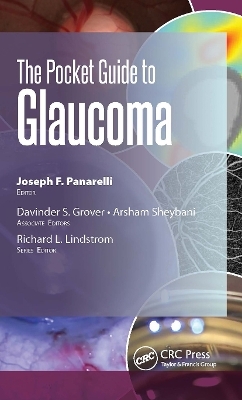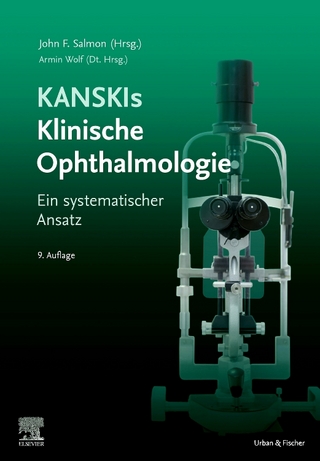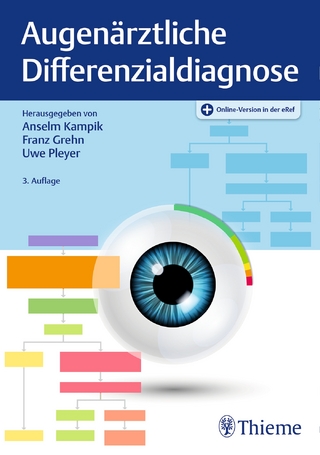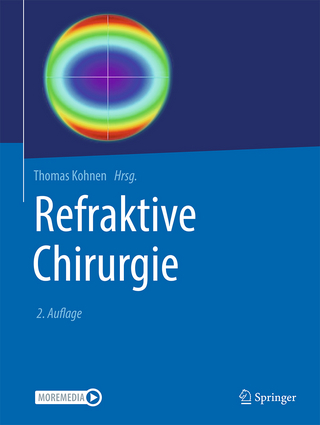
The Pocket Guide to Glaucoma
SLACK Incorporated (Verlag)
978-1-63091-670-1 (ISBN)
- Lieferbar (Termin unbekannt)
- Versandkostenfrei innerhalb Deutschlands
- Auch auf Rechnung
- Verfügbarkeit in der Filiale vor Ort prüfen
- Artikel merken
Drs. Joseph F. Panarelli, Davinder Grover, Arsham Sheybani, and colleagues have designed this book as the ultimate quick-read manual on glaucoma, using a conversational tone that allows readers to retain information in the most effective manner. Medical students, residents, and fellows can use this accessible, high-yield handbook during their rotations to familiarize themselves with the essentials on glaucoma, while general ophthalmologists will be glad to have it as a quick reference guide to current best practices.
Each chapter in The Pocket Guide to Glaucoma is arranged in short, easy-to-read sections and is accompanied by numerous color photographs to aid in recognition and retention.
Among the topics covered:
Optic nerve head imaging
Laser procedures for glaucoma
Medical therapy for glaucoma
Microinvasive glaucoma surgery
Traditional glaucoma surgery: pearls and pitfalls
Landmark glaucoma trials
Eye care providers at all skill levels will benefit from the high-yield, quick-access information contained in The Pocket Guide to Glaucoma, whether they are preparing for their first surgeries or are longtime physicians.
Joseph F. Panarelli, MD is an associate professor of ophthalmology at the New York University Grossman School of Medicine who specializes in the treatment of adult and pediatric glaucoma. Dr. Panarelli is certified by the American Board of Ophthalmology, and he is a member of the American Glaucoma Society as well as the American Academy of Ophthalmology. He received his Bachelor of Science in Finance from the Georgetown University McDonough School of Business in 2003 and his medical degree from the Georgetown University School of Medicine in 2007, where he was elected to the Alpha Omega Alpha Honor Medical Society during his junior year. He completed a residency in ophthalmology at the New York Eye and Ear Infirmary, where he served as chief resident during his final year of training. He was awarded the William and Judith Turner Award for excellence in ophthalmologic training. Following a year of fellowship training in glaucoma at the Bascom Palmer Eye Institute at the University of Miami Leonard M. Miller School of Medicine, he joined the faculty at Bascom Palmer for an additional year prior to returning to New York Eye and Ear Infirmary as a member of the full-time faculty. For 5 years there, he was active in resident education, serving as the associate residency program director as well as glaucoma fellowship director. Dr. Panarelli recently transitioned to New York University, where he serves as the chief in the Division of Glaucoma Services and director of the Glaucoma Fellowship. Dr. Panarelli is the recipient of several awards, including the Mentoring for Advancement of Physician-Scientist Award from the American Glaucoma Society, and he was selected as a Castle Connolly Top Doctor from 2017 to 2020. He has published extensively in his field and is a principal investigator for numerous studies pertaining to the surgical management of glaucoma. Davinder S. Grover, MD, MPH is an attending surgeon and clinician at Glaucoma Associates of Texas based in Dallas. His interests include innovative glaucoma surgeries, complex glaucoma, cataract and anterior segment surgeries, as well as clinical research outcomes in medical and surgical glaucoma. He has helped develop several innovative surgical techniques and has designed several novel surgical instruments. Dr. Grover also serves on the Board of Directors for the Cure Glaucoma Foundation, a charitable organization with a mission to improve access to quality care, fund transformational research, and disseminate knowledge through global outreach efforts. He is the director of research at Glaucoma Associates of Texas. He has authored more than 40 peer-reviewed articles and more than 10 book chapters and has lectured around the world on glaucoma and innovative glaucoma surgeries. Dr. Grover received his medical degree from The Johns Hopkins University School of Medicine in Baltimore, Maryland. He attended residency at the Wilmer Eye Institute at The Johns Hopkins Hospital and completed his glaucoma fellowship at the Bascom Palmer Eye Institute at the University of Miami Leonard M. Miller School of Medicine. Additionally, Dr. Grover also received a Master of Public Health degree at the Harvard T.H. Chan School of Public Health. Arsham Sheybani, MD completed his medical degree with honors (AOA) at Washington University School of Medicine in St. Louis, Missouri. He then completed his residency in ophthalmology at Washington University in St. Louis and was selected to remain on faculty as chief resident. During that year, Dr. Sheybani was responsible for ophthalmologic trauma and emergencies as well as all adult inpatient ophthalmology consultations at Barnes-Jewish Hospital. He was the primary surgical teacher for the beginning residents and implemented a didactic system that is still used at Washington University. He then completed a fellowship with Iqbal “Ike” K. Ahmed in glaucoma and advanced anterior segment surgery in Toronto, Canada. He subsequently returned to Washington University School of Medicine as faculty in the Department of Ophthalmology and Visual Sciences, where he serves as residency program director. He has presented research internationally and is currently involved in device design aiming to make glaucoma surgery safer, among many other endeavors. He is an avid surgical teacher, winning the resident-selected faculty teaching award early in his career. He has also helped create one of the highest volume surgical glaucoma fellowships in the country, serving as the fellowship director.
Dedication About the EditorAbout the Associate Editors Contributing AuthorsIntroduction Chapter 1: Glaucoma: Classification and Appropriate TerminologyWen-Shin Lee, MD and Jeffrey L. Goldberg, MD, PhDOpen-Angle GlaucomaAngle-Closure GlaucomaPediatric Glaucoma Chapter 2: What Is Glaucoma and Who Is At Risk for It?Kateki Vinod, MDAnatomy and PathophysiologyRisk Factors Chapter 3: Measuring Intraocular PressureLilian Nguyen, MD; John T. Lind, MD, MS; and Sara J. Coulon, MDApplanationDynamic Contour TonometryRebound TonometryIndentation TonometryNoncontact or Air-Puff TonometryOcular Response AnalyzerDigital TonometryTranspalpebral TonometryFactors That Affect Intraocular Pressure MeasurementsThe Future of Measuring Intraocular Pressure Chapter 4: Anterior Segment Imaging: What Should You Use and When?Janice Kim, MD; Kitiya Ratanawongphaibul, MD; and Teresa C. Chen, MDUltrasound BiomicroscopyAnterior Segment Optical Coherence Tomography Chapter 5: Optic Nerve Head Imaging in GlaucomaRavneet S. Rai, MD; Gadi Wollstein, MD; and Joel S. Schuman, MDStructural Changes in GlaucomaOptic Nerve Head Imaging ModalitiesNew Frontiers in Imaging Chapter 6: Visual Fields: What I Need to KnowAhmad A. Aref, MD, MBA and Donald L. Budenz, MD, MPHRole of Perimetry in Glaucoma ManagementKinetic Versus Automated Static PerimetryAutomated Visual Field Testing ProtocolsInterpreting the Swedish Interactive Testing Algorithm Standard 24-2, Size III Single Field Analysis PrintoutSeverity StagingAssessing ProgressionPitfalls and Artifacts Chapter 7: Laser Procedures for GlaucomaJ. Minjy Kang, MD and Paul A. Sidoti, MDLaser BasicsCommon Glaucoma Laser Procedures Chapter 8: Medical Management of GlaucomaSara J. Coulon, MD and Murray Fingeret, ODMedication ClassesBeginning TreatmentThe Monocular Trial: Where Has It Gone?Follow-Up VisitsWhen to Advance Treatment Chapter 9: Microinvasive Glaucoma Surgery: Trabecular Bypass/Ablation ProceduresIqbal Ike K. Ahmed, MD and Anna T. Do, MDSchlemm's Canal–Based MicrostentsTrabecular Ablative Procedures Chapter 10: Canal-Based Glaucoma SurgeryJonathan B. Lin, MD, PhD and Arsham Sheybani, MDAb Interno CanaloplastyGonioscopy-Assisted Transluminal TrabeculotomyOMNI Glaucoma Treatment System Chapter 11: Microinvasive Glaucoma Surgery: Suprachoroidal Drainage DevicesJing Wang, MDCyPass Micro-StentiStent Suprachoroidal Drainage System (iStent Supra)MINIject Chapter 12: Subconjunctival/Sub-Tenon's ImplantsEunmee Yook, MD and Davinder S. Grover, MD, MPHXen Gel StentPreserFlo MicroShunt Chapter 13: Trabeculectomy: Pearls and PitfallsJonathan S. Myers, MD and Natasha Nayak Kolomeyer, MDInjection of Mitomycin C (Mitomycin Option #1)Scleral Flap ConstructionInsertion and Removal of Mitomycin C–Soaked Pledgets (Mitomycin Option #2)Scleral Flap ResistanceConjunctival ClosurePearls/PitfallsPostoperative Management of TrabeculectomyTrabeculectomy-Related Papers to Familiarize Yourself With Chapter 14: Glaucoma Drainage DevicesSonal Dangda, MS (Ophthal) and Steven J. Gedde, MDIndicationsContraindicationsMechanism of ActionTypes of Glaucoma Drainage DevicesSurgical ProcedureGlaucoma Drainage Device Outcomes Chapter 15: Childhood Glaucoma: Update on Surgical ManagementR. Allan Sharpe, MD and Lauren S. Blieden, MDExamination Under AnesthesiaSurgical ApproachesCyclodestructive Procedures Chapter 16: Landmark Glaucoma TrialsRachel Lee, MD, MPH and Kuldev Singh, MD, MPHOcular Hypertension Study (2002)Early Manifest Glaucoma Trial (1999)Advanced Glaucoma Intervention Study (1994)Collaborative Initial Glaucoma Treatment Study (1999)Collaborative Normal-Tension Glaucoma Study (1998)Glaucoma Laser Trial (1990)European Glaucoma Prevention Study (2002) Chapter 17: Update on Glaucoma Surgical TrialsEileen C. Bowden, MD and Ruth D. Williams, MDData Analysis of the Ahmed Baerveldt Comparison Study and the Ahmed Versus Baerveldt StudyTube Versus Trabeculectomy Study: Five Years of Follow-UpPrimary Tube Versus Trabeculectomy Study: One Year of Follow-UpCOMPASS TrialAb Interno Gelatin Stent in Refractory GlaucomaFinancial Disclosures Index
| Erscheinungsdatum | 10.08.2020 |
|---|---|
| Reihe/Serie | Pocket Guides |
| Verlagsort | Thorofare |
| Sprache | englisch |
| Maße | 108 x 178 mm |
| Gewicht | 560 g |
| Themenwelt | Medizin / Pharmazie ► Medizinische Fachgebiete ► Augenheilkunde |
| ISBN-10 | 1-63091-670-6 / 1630916706 |
| ISBN-13 | 978-1-63091-670-1 / 9781630916701 |
| Zustand | Neuware |
| Haben Sie eine Frage zum Produkt? |
aus dem Bereich


